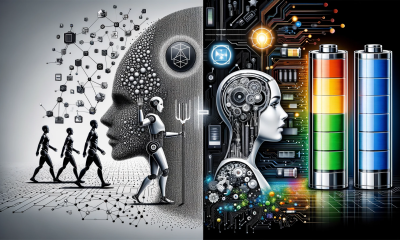Interviews
Justin Banon, Co-Founder of Boson Protocol – Interview Series

Justin Banon is the Co-Founder of Boson Protocol, a company specializing in the tokenization of both tangible and intangible assets. Made possible through the use of an ‘optimistic fair-exchange protocol', this company and its services are poised to change the way asset ownership is viewed.
To kick things off, tell us about yourself! How did you become Co-founder of Boson Protocol?
My background is a combination of business and academic. I started out doing a physics degree and then ended up working for a company called Priority Pass, which sold airport lounge visits through paper and plastic vouchers. In parallel, I started a Master's in digital innovation and combined the two to begin a digital transformation of Priority Pass. This involved selling physical products and services as digital vouchers and turned out to be a successful idea, as I then scaled that business from 50 million to a billion-dollar turnover. I continued on to do a second Master's, but this time in crypto. During this time, I considered what would happen if we moved from paper and plastic to digital and then blockchain vouchers for physical things — leading to the birth of Boson Protocol.
What services are on offer by Boson Protocol, both now and in the future?
We've recently finished the core build detailed in our 2019 (v1) and 2022 (v2) whitepapers. We have also achieved our initial goal, which was to construct the decentralized commerce infrastructure for the emerging Web3 economy. This comprised, firstly, a decentralized commerce protocol, enabling the trust-minimized exchange of real-world assets, without centralized intermediaries, just code. We then built a suite of dCommerce dApps, enabling anyone to sell physical things as NFTs online, in-metaverse and on NFT marketplaces.
In terms of what's next, by early Q4 2023, we will have completed the build of Web2.5 bridges, including fiat onramps, custodial wallets, and web widgets; enabling mainstream buyers and sellers to use Boson. We are also partnering with WooCommerce, the world's largest e-commerce platform, enabling millions of Woo sellers to use Boson.
In the past, you have spoken on Web3 and how, by 2025, it has the potential to transcend e-commerce beyond its use of siloed, closed, and proprietary systems. How is this possible, and what benefits will it provide?
To quote an article that I featured in published by the World Economic Forum:
“By 2025, Web3 technologies will have revolutionized the world of commerce, in much the same way that Web2 transformed access to information. Physical and digital (phygital?) ‘things' will be listed and traded on an open, liquid, digital market… With the exchange of physical assets, the need to manage counterparties' risk, mediate disputes, and ensure settlement, requires trust. This trust is vested in either trusted intermediaries or trusted sellers. Consequently, e-commerce transactions are mostly siloed within one of many, closed, proprietary systems” (Yoon, 2022).
In terms of benefits, “just as decentralized finance's ‘money lego' applications have begun to unbundle traditional finance, an ecosystem of decentralized ‘commerce lego' protocols and applications will evolve to create an open marketplace for things, where everyone can share in the value they create” (Yoon, 2022).
NFTs are often pigeonholed, only being thought of as whimsical .jpegs among the general public. Can you elaborate on how leveraging smart contracts and non-fungibility make them so much more?
The first use case for NFTs is, dare I say, expensive JPEGs. However, NFTs do have the potential to be canonical digital objects and needn't be just images. Boson NFTs are connected to smart contracts which escrow funds and are encoded with game theory to provide strong and verifiable assurances to buyers that either they will receive the physical goods or their money back.
Redeemable NFTs address the problem of how to digitally represent a physical asset, by providing assurances to the bearer of an rNFT that either they will receive the item or their money back. rNFTs represent the right to redeem physical assets on-chain, thus enabling the vision of a single, digital market for physical things, built on Web3 infrastructure.
Over the years, we have seen examples of companies tokenizing cars, art, wine, real estate, and more. What makes such assets ideal for tokenization, and can we expect to see similar offerings made available through Boson Protocol?
I think we'll see almost all assets tokenized. I subscribe to the thesis that our future civilization will run on blockchain and it would be deemed negligent to transact any value on a system other than a blockchain.
The base layer of Boson Protocol is opinionated and a highly generic protocol for transacting any physical or digital asset. However, the higher application levels that we've built are tailored towards the exchange of the tokenization and decentralized exchange of physical products, which could include cars, art, wine, and potentially real estate.
However, that is not to say that we or others could not build applications on top of Boson's base protocol. These applications would then be more tailored towards, for example, property rentals, commodities or other specific services and offerings.
Any time an asset is tokenized, a question must be posed – is the resulting digital representation a security? Can you elaborate on why, or why not, assets tokenized through Boson Protocol may be classified as such?
In general, the classification of a security is given by the nature of the underlying asset. With Boson, we tokenize what can be thought of as NFT vouchers but the fact that we're using blockchain technology doesn't make this a security. As I explained previously, you can have a paper, plastic, or digital voucher that is redeemable for a physical item. With Boson, we create an NFT voucher that is redeemable for a physical thing and so our vouchers are not per se classified as securities.
“One Button, three lines of code. Any site, anywhere.” What does Boson Protocol mean by this, and why is it important?
You can embed redemption functionality on any website by merely adding three lines of code to embed the widgets. This is so people can sell redeemable NFTs anywhere, whilst ultimately bringing the users back to their site to redeem physical NFTs, in order to develop direct relationships with Web3 customers- rather than ceding these relationships to NFT platforms, and to retain control of the customer experience, whilst developing a Web3 community on their own site.
Despite its potential, the idea of Real-World-Asset (RWA) tokenization remains somewhat niche within the world of digital assets. What do you believe it will take for this to change?
This is already rapidly changing. In addition to Boson signing partnerships to integrate with eCommerce market leader WooCommerce, the current state of play is that traditional finance giants, such as Blackrock, as well as RWA startups, such as Tzero, Securitize, and Polymath, are using the blockchain to tokenize RWAs. A quote from Blackrock CEO Larry Fink springs to mind here: “the next generation for markets, the next generation for securities, will be tokenization of securities.”
Over the past year, various reports have pointed to tokenization efforts representing billions in capital in the coming years. Do you give credence to these claims?
To give credence to these claims, we simply need to give credence to three premises. Firstly, blockchain tokenization is a superior technology for representing real-world assets. Secondly, you have the CEO of the world's largest investment company, BlackRock, confirming that tokenization will be the de facto technology for securities moving forward. Finally, RWA tokenization represents a multi-trillion-dollar industry that will only grow over the next five years. Put those together and you get a strong argument that: “tokenization efforts will represent billions in capital in the coming years”
Is there anything else that you would like to share about Boson Protocol?
Yes! When crypto recovers from the current winter, Boson Protocol will be product-complete and mass adoption-ready. We aim to seize the multi-trillion dollar opportunity to become the TCP and IP of commerce in the forthcoming Web3 economy.
Thank you to Justin Banon for the interview! For readers interested in learning more about this promising company, make sure to visit our investing guide, or Boson Protocol directly at bosonprotocol.io











